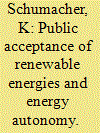| Srl | Item |
| 1 |
ID:
154986


|
|
|
|
|
| Summary/Abstract |
Do certain cultures or religions predispose citizens to support the deployment of torture against suspected terrorists? Based on an international survey of 31 different countries, we examine how religion and culture affect respondents' position on torture. We find that at the individual level, the nonreligious are resolutely opposed to torture, and that Christians, Buddhists, Hindus, Jews, and other faiths are more supportive. Among world cultures, Muslim/African cultures are most opposed to the torture of terrorists, while Confucian, English-speaking, and South Asian cultures are the most supportive of it. We also find that the use of torture has less support in countries that are suffering from terrorism, once religion and culture are considered.
|
|
|
|
|
|
|
|
|
|
|
|
|
|
|
|
| 2 |
ID:
163541


|
|
|
|
|
| Summary/Abstract |
In the context of climate change mitigation and increasing decentralized generation of energy from renewable sources, public acceptance of renewable energy (RE) has become an important issue in energy research. Many studies have addressed public acceptance through a case-based empirical lens with rather specific conclusions for individual technologies in a given context. This paper draws more universal insights by conducting an online survey on public acceptance for a set of technologies in the three sub-regions of the Upper Rhine region (URR). Using a representative dataset of 495 German, 501 French, and 493 Swiss inhabitants of the URR, several hypotheses from the acceptance literature are tested across sub-regions and RE technologies and results are compared to related empirical studies from the literature. Moreover, we explore for the first time how public acceptance is linked with community energy and energy autonomy. The latter is especially important to understand how policy and project initiators can mobilise the population to contribute to the energy transition. Our main findings are that public acceptance is, inter alia, highly dependent on the technology in question, the dimension of social acceptance (community versus socio-political dimension) and previous experiences with RE technologies.
|
|
|
|
|
|
|
|
|
|
|
|
|
|
|
|